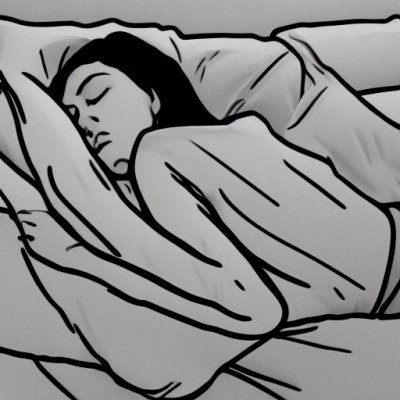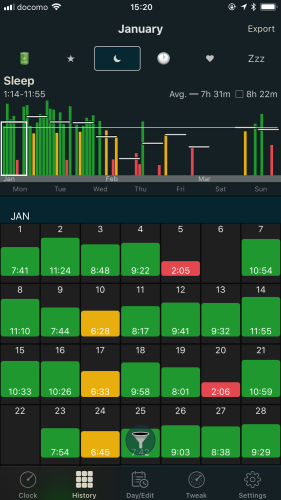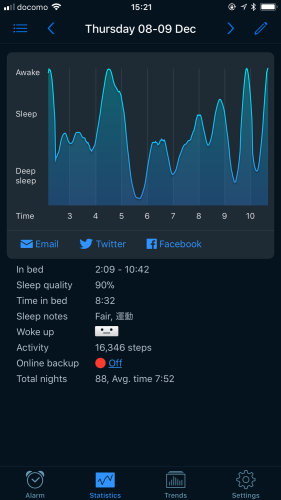Sleep and Productivity

Your body plays a big and important role in life, and also in your work. If your body disagrees, you won’t be able to focus, and won’t be able to do efficient work.
A crucial factor is sleep. If not well rested, concentrating will feel hard. While possibly being able to physically come to work, the actual work will definitely not be very efficient, or as efficient as it could be.
Try to improve your productivity by having a good sleeping schedule and hygiene. There are many smaller things which can help with this. Tracking your sleeping time will give insight on what to improve. Using a smartwatch, like the Apple Watch, can help further.
Sleep as a means of productivity
Sleep is important for work. This is backed by research. Researchers found that fatigue-related symptoms cause an average cost of $1967 per employee per year to businesses. This is also time and money lost in personal productivity.
Here, two things are crucial: The amount of sleep, and the depth, or quality of sleep.
The national sleep foundation recommends about 7-9 hours a sleep for a healthy, working, adult. This is individual, so even 6 or 10 hours might be perfectly normal, if your body says so. Important here: Actually listening to the body.
For depth of sleep, the sleep hygiene is important. Having good sleep, not being distracted or half-awake during the sleep time.
Guaranteeing sleep hygiene
Sleep hygiene should be a thing to care about. One of the most important points: Don’t work (and think about work) until the last minute. Try to have an hour or so of cooldown time after work.
It is crucial to not think about working related issues until the minute you want to go to bed. Otherwise, it will keep you up, or vastly reduce the depth of sleep. Private time! Whether it is television, movies, video games, or time with your family, it will help with providing a distraction for your last hour of the day.
There are various other small things, which can tremendously help with falling asleep after a day of work:
- Using the phone or tablet in bed is a bad habit, which can keep you awake much longer than planned. It can also make you awake, which is contra productive.
- If using a monitor until late night, use night-shift functionality if available. Night-shift functionality is often built into the operating system or available through apps like flux. They shift the screen color from a bluish tint to an orangish tint, which is supposed to help with sleep hygiene.
- Drinking alcohol before sleep can vastly reduce the depth of sleep.
Regular sleeping time
A regular sleeping schedule is also important for maintaining a healthy lifestyle. Of course, it is largely related to external factors like working shifts, but should be implemented as possible. Consistency is important.
If possible, select a sleep and wake-up time which is roughly identical for most days of the week. This will ensure your body’s internal clock to work.
Tracking sleep
To gain knowledge about your own sleeping habits, it might be worthwhile to track your sleeping time. If tracking the sleeping time daily, it is easy to analyze the hours of time slept, the going-to-sleep and wake-up times, and so on.
If the analog type, you can simply write a small journal about your sleeping times. Take a note about the approximate time of going to sleep, and then just look at the watch after waking up in the morning.
For the more digital person, apps could be an alternative.
AutoSleep 5
One option would be the iOS app AutoSleep ($2.99), which uses the accelerometer and heart rate tracker of the Apple Watch to estimate sleeping time automatically. The user can normally go to sleep wearing his or her Apple Watch every day, no setup or maintenance needed. Then, the app creates statistics about your sleep hygiene.

Using the iPhone app, you can retrieve various statistics. It will categorize the sleep’s depth and tries to estimate the quality of sleep from that. Depending on how much movement you have during your sleep, the app estimates whether your sleep was light, or rather deep.
On top of that, AutoSleep is packed with different ways to visualize your sleep patterns. In a calender view, you can see your average sleeping times, quality of sleep, average heart rate, and so on. This includes an easy way to see which time you went to sleep, or woke up, on any given day. Selecting a single day, it shows you a detailed overview on that day,
In my experience, AutoSleep can detect this pretty well, as it can easily detect whether you are already sleeping or still playing on your tablet. As the application needs no setup and just runs passively, it even recognizes napping and falling asleep by accident. This way, you get a comprehensive insight on your whole sleeping schedule.
Sleep Cycle
The app Sleep Cycle (freemium) can track your sleeping hygiene by simply running the app on your phone or tablet on the night stand. The app will use your sleeping noise like snoring and movements during sleep to estimate your sleeping time, wake-up time, and even depth of sleep. It can also create an alarm in an ideal time, which might wake you up more easily than a static alarm (i.e. the alarm will be scheduled during a period of shallow sleep.)

In my experience, the application is less accurate than, let’s say, AutoSleep, as the sleeping noise is simply not a very accurate measure for this kind of thing. Nonetheless, it can provide a good insight on how many hours you sleep per day, and how your bio-rhythm performs, simply due to actively using a way to track sleeping times.
Keep in mind, that this alternative does not track automatically, so a night where Sleep Cycle has not been activated manually is a blind spot in the tracking.
Sleep Cycle also has an Apple Watch app, which helps your sleep: It can’t auto-detect your sleeping patterns, but it tries to stop you from snoring with little vibrations whenever it detects your snoring. Maybe a worthwhile investment, for you, or your significant other.
Conclusion
Sleep is important for the body and also for your productivity. Assuring both enough sleeping hours and a good sleeping hygiene can guarantee a healthier and more productive lifestyle.
Trying to distract the mind directly before going to sleep will help with sleeping depth psychologically. Physically, avoiding alcohol can also help. Don’t use the phone in the bed; if absolutely needed, at least use some night-shift functionality making the screen tint orange.
To get more insight on your sleep, it is worthwhile to track your sleeping times for a while. Then you know, what to improve, how many hours you actually sleep, and how it will connect to your productivity. With AutoSleep, this process can be automatized by simply wearing your Apple Watch to sleep every day.
There are also other factors related to productivity, like working hours, diet and workouts, are of equal importance to a healthy life- and workstyle.
Disclosure: This post may contain affiliate links. This means I may make a small commission if you make a purchase.
About me

Marc
I am a lecturer in field of computer science. I am interested in task- and knowledge management. Sometimes, I blog on productivity workflows, apps, and other related non-work stuff I'm working on.
See Also
Approaching personal productivity
The term productivity is vague. It can mean different things. Does one want to have more working time per day, or rather do the same work …
Read More...Keeping health above work
Many people like to work. Many people do not. If browsing websites about productivity, one is probably in the former camp. One way or …
Read More...Minimizing and handling multiple inboxes
In daily work life, very few things can create more anxiety than the worry of forgetting something. It seems close to Getting Things Done …
Read More...